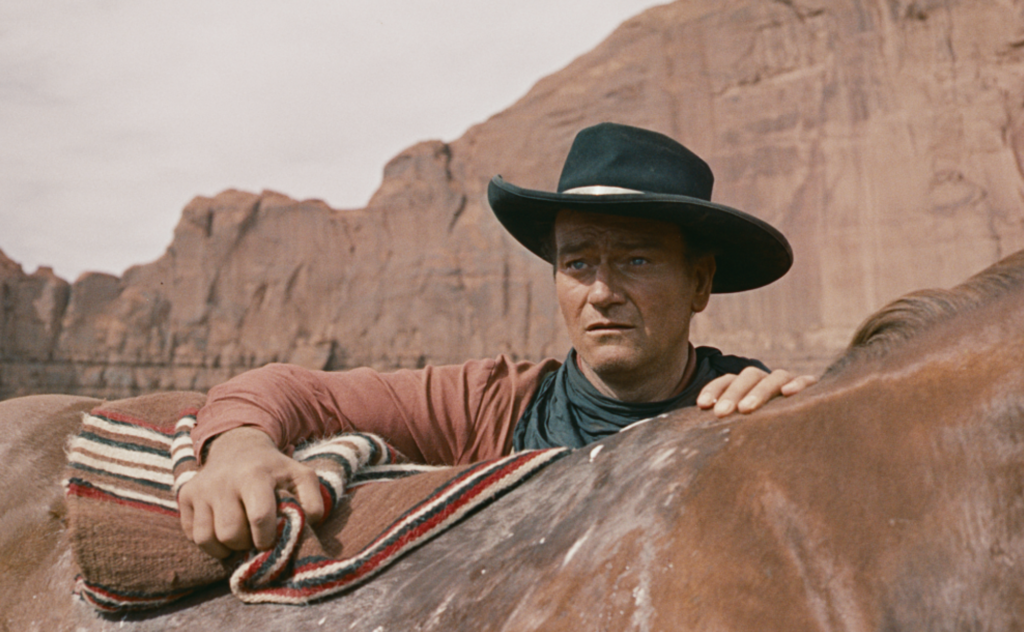A John Wayne Film Whose Reputation Precedes It, ‘The Searchers’ Lands at Film Forum in a 4K Restoration
While ‘The Searchers’ is by no means perfect, it is director John Ford’s most painterly movie. Even when the scenes have been contrived in a Hollywood backlot, the movie is rich in color and encompassing in space.

Cynthia Ann Parker or, as she came to be known, Na’ura, was born in Illinois’s Crawford County sometime around 1827. Her father, Silas M. Parker, along with brother James, traveled west with their families and established an eponymous fort in what is now Groesbeck, Texas. Although the outpost was heavily fortified, the colony met a grim fate at the hands of a nearby band of the Comanche people.
Nine-year-old Cynthia Ann was spared and adopted by the tribe. She later married a chief, Peta Nocona, and they began a family. Twenty-three years later, the Texas Rangers captured the woman and returned her to her Anglo family. Parker bristled under these new or, rather, old circumstances. She attempted to escape, but to no avail. Na’urar died, desperately missing her Comanche family, at the age of 43.
This story was adapted by the novelist Alan Le May, who, though a screenwriter, didn’t write the silver screen version. That job went to a one-time film critic for the New York Times, Frank S. Nugent, who was, as it turned out, a natural at writing scripts. He found a simpatico collaborator in the director John Ford and wrote 11 of his films, some of them being very good indeed. These include “Fort Apache” (1948), “She Wore A Yellow Ribbon” (1949), “The Quiet Man” (1952), and, the Le May adaptation, “The Searchers” (1956).
Film Forum will be hosting a one-week run of the latter film in a new 4K restoration. Cynthia Ann Parker’s story was gussied up for the Hollywood variation and shaped to the prevailing ethos of the time. Although the denouement of the picture is ostensibly open-ended — we never learn how Parker’s cinematic stand-in, Debbie (Natalie Wood), readjusts to her biological family — it nevertheless confirms that home is where you hang your original ethnicity.
“The Searchers” isn’t, as the title makes plain, about Debbie. It’s about Martin Pawley (Jeffrey Hunter) and Ethan Edwards (John Wayne). The two men have tasked themselves with rescuing Debbie from the clutches of a band of Comanches led by the fearsome Scar (Henry Brandon). Their search takes five years, during which time Pawley and Edwards encounter a variety of obstacles, primarily Ethan’s abiding racism. His idea of rescuing Debbie is to put her out of his misery. Even as we watch Ethan’s hair gray his animus toward Native Americans stays true.

The reputation of “The Searchers” precedes it, but that wasn’t always the case. Upon its initial release, the critical reaction was lukewarm. The tide began to turn when a young critic by the name of Jean-Luc Godard testified to how Ford’s picture upset his radical bona fides by prompting him to love a Republican. (You know, John Wayne.) Since then, the film has regularly topped this-or-that list of greatest films, having been extolled by a host of directors, and hitched to a number of ideological currents. As for the latter, immovable cultural artifacts attract such things.
“The Searchers” is Ford’s most painterly movie. Even when the scenes have been contrived in a Hollywood backlot, the movie is rich in color and encompassing in space. It’s by no means perfect: the plot takes awkward detours and Ford’s fondness for peppering his pictures with overt comic shtick hasn’t dated well. The picture is genuinely funny when humor arises from the interplay between characters. The reactions of a crowd watching the fisticuffs between dueling suitors for the hand of Laurie Jorgensen (Vera Miles) is, in that regard, a delight.
Why “The Searchers” hasn’t achieved the status of Hollywood entertainments on the scale of “The Wizard of Oz” (1939), “Casablanca” (1942), and “It’s a Wonderful Life” (1946) is a good question. Perhaps it’s the film’s stilted structure or its treatment of Native Americans, particularly the abuse suffered by “Look” (Beulah Archuletta). Like Godard, a lot of people are likely put off by even a whiff of Wayne’s conservatism. Good luck marketing the picture to our contemporary generation of puritans.
Still, here’s a thought for selling the movie to younger audiences: positing Ethan Edwards as a multiculturalist. It’s worth underlining that Wayne’s character is well-versed in the customs, lifestyles, and languages of not only different Native American tribes, but the Latinos of whom he is more fond. Ethan Edwards has, in other words, “done the work,” and if that hasn’t quelled his intolerance, well, neither has it done so for the academic culture from which identity politics stems.
Whatever. “The Searchers” is a supernal movie. The opportunity to see it on a biggish screen in the company of others shouldn’t be missed.

